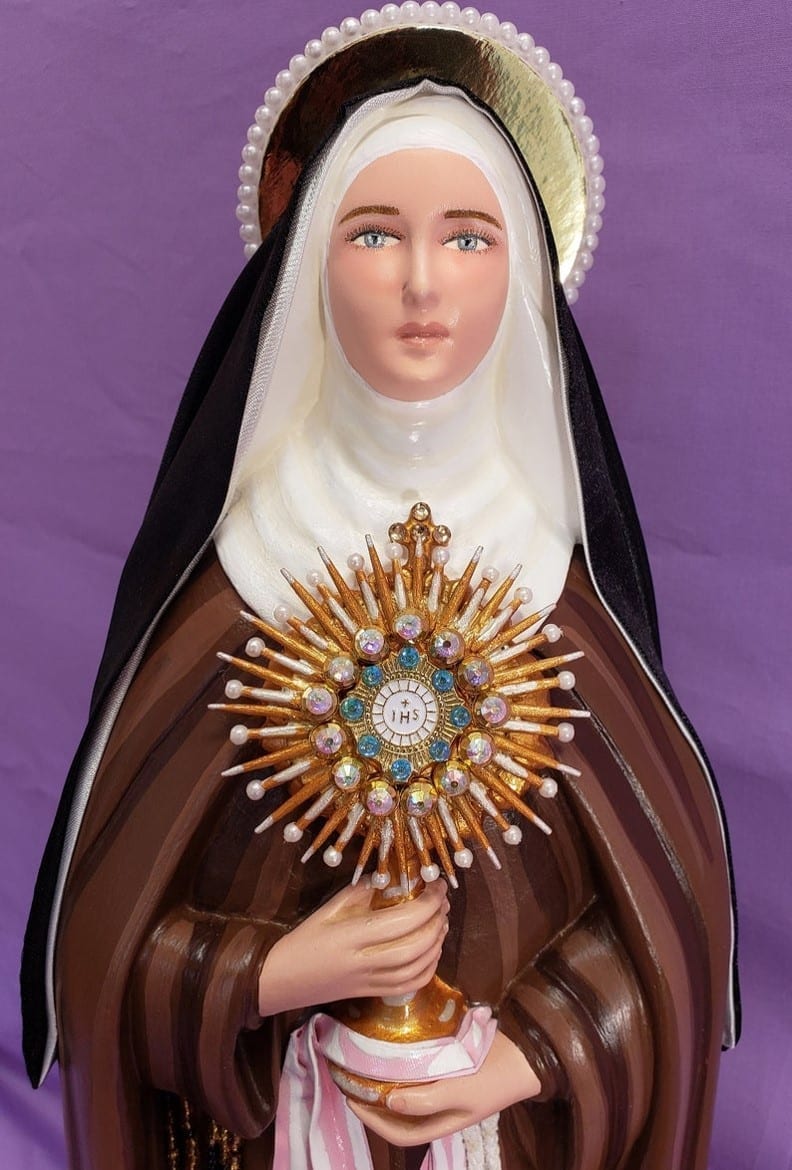Our school’s namesake was born in Assisi, Italy on 19th July 1194. Even as a child, Clare had a special friendship with Jesus. She loved to pray and to do holy things for him, but it was the preaching and example of a young man named Francis during Lent of 1212 that gave the eighteen-year-old Clare a path for her life.
Francis, who was several years older than Clare, had also grown up in a wealthy, important family in Assisi (although not as wealthy and important as Clare’s). He had given all of that up, following the instruction of Jesus to the rich young man in the Gospel: “If you wish to be perfect, go, sell your possessions, and give the money to the poor, and you will have treasure in heaven; then come, follow me” (Matthew 18:21). At first, the people of Assisi had thought he was crazy; but over time, as they saw his joy and happiness, and his kindness to the poor and to all creatures, they began to admire him, calling him Poverello, the poor little one. Many of the other young people of the area began to be attracted to his way of life, and before long, a little band of young men had gathered around him.
However, it wasn’t only the young men who were inspired by the ideals and example of Francis. Many young women would have joined him as well, if they could have. But in those days, young women—especially young noblewomen such as Clare—had two options in life: marriage or life in a cloistered monastery. There were many monasteries for women nearby, but none that lived in complete poverty as Francis and his companions did, owning nothing so they might be totally dependent on God.
Clare’s father, Count Favorino Scifi, had made plans for his beautiful daughter to marry a rich young nobleman. But Clare, who had given her heart completely to Jesus as a young teenager, was determined not to marry. Clare knew her father, who had a stubborn streak and a hot temper, would not grant her wish easily. So after meeting secretly with Francis about what to do, she and her cousin Pacifica slipped out of the palace in the middle of the night on March 20—Palm Sunday and the beginning of Holy Week.
Although the night was dark, Francis sent his companions out to meet Clare and Pacifica with torches, to light the way. When the brothers met the young women, they broke into song as they proceeded to the little chapel of Saint Mary of the Angels. There, Clare and Pacifica traded their rich clothing for simple habits and veils, and after singing and praying, Francis cut off Clare’s long, beautiful hair as a symbol of her commitment to a new way of life.
Count Scifi was so enraged when he discovered that Clare had become a nun, he rounded up his best knights and rode straightaway to the Benedictine monastery where Clare and Pacifica were staying until Francis could find them a more suitable place. Shouting and cursing, he stormed into the chapel where Clare was praying. But no matter how he raged, Clare refused to return home with him.
“You have given your allegiance to that young troublemaker, Francis, rather than obeying me, your father!” Count Scifi shouted.
“No, Father,” Clare replied calmly. “I have given my allegiance to Christ; Francis only showed me the way.” At that, the exasperated count grabbed Clare to drag her home. But Clare grabbed hold of the altar and would not let go.
It turned out that the daughter of Count Scifi had a stubborn streak of her own, at least when it came to the pursuit of holiness.
She would need that holy stubbornness on several occasions throughout the remainder of her life. More than once, her bishop or even the Pope tried to force the religious order she co-founded with Francis, the Order of the Poor Ladies (now known as the Poor Clares) to hold property rather than remaining completely poor. But Clare insisted on following the path of radical poverty set by Francis, even long after Francis had died. In the end, her wishes prevailed.
Another time, invaders were preparing to attack the monastery of San Damiano, home to Clare and her sisters. Clare, who was quite ill at the time, rose from her bed, took the ciborium containing the Holy Eucharist from the chapel, and went to an open window where the invaders had already placed a ladder. There she stood, holding high the Blessed Sacrament. The soldiers coming up the ladder fell backward, dazzled, and fled, leaving the community in peace.
All of which proves that a little stubbornness isn’t necessarily a bad thing, when it is used for the sake of Christ!
Clare died on 11th August 1253. 11th August is now her Feast Day. She is known today as the Patron Saint of embroiderers, goldsmiths, those with eye disease, television, good weather and laundry workers.



